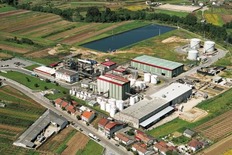- The Green UMIA project will invest over €40 million and generate 900 jobs during construction and 265 during operation.
- The project aims to produce 2,900 tons of renewable methanol annually, reducing 58,000 tons of CO2 over 10 years.
- Commercial operation is scheduled for July 2025, with energy supplied by the Castro Valente wind farm.
- The wind farm will involve a €14 million investment, generating 70 jobs during construction and 5 during operation.

Project Overview
Iberdrola and Foresa are advancing their alliance to lead green methanol production in Galicia, Spain. Their first project, Green UMIA, is located in Caldas de Reis (Pontevedra) and aims to produce 2,900 tons of renewable methanol annually. This initiative will reduce 58,000 tons of CO2 over its first 10 years of operation.
Investment and Job Creation
The Green UMIA project involves an investment of over €40 million. It is expected to generate up to 900 jobs (direct, indirect, and induced) during the construction phase and 265 jobs during the operation phase. Additionally, the project supports the decarbonization and sustainability of the strategic wood value chain in Galicia.
Energy Supply
For the production of green hydrogen, which is essential for green methanol, the energy supply will come from the Castro Valente wind farm. Located 12 km from the methanol plant, the wind farm will consist of three wind turbines with a total power of 18 MW. The construction of this wind farm will involve an investment of approximately €14 million and will generate around 70 jobs during the construction phase and around 5 jobs during the operation phase.
Regulatory and Strategic Importance
The green methanol plant and the new renewable facility for electricity supply have been declared a Priority Business Initiative (IEP) by the Regional Government of Galicia, allowing for expedited procedures and a commercial operation start date of July 2025. This project aims to replace grey methanol, which is primarily imported and associated with high CO2 emissions, with locally produced green methanol, thereby reducing emissions and strengthening the EU's autonomy.

